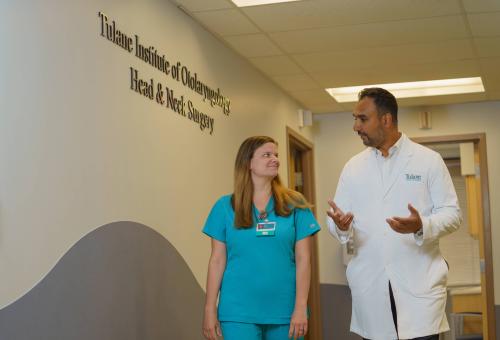
The Tulane Head and Neck Oncology Program offers comprehensive, specialized care for patients with benign and malignant tumors located between the brain and the clavicle, anterior to the spine, including tumors of the parotid, pharynx, larynx, jaw, tongue, thyroid and carotids (neck vessels).
The Tulane Head and Neck Oncology Program has sustained a regional and national reputation particularly with regard to parotid surgery, pharyngeal surgery, and mandible-sparing procedures for oral cavity tumors. Division of Head and Neck Surgery team members offer interdisciplinary specialization in head and neck oncology and reconstructive surgery as well as laryngeal physiology and speech therapy. Plastic surgeons, neurosurgeons, ophthalmologists, maxillofacial experts, and radiation oncologists work closely as a team to deliver state of the art medical care for the Gulf Coast region and beyond. Read More
The initial consultation involves a complete voice evaluation by a head and neck surgeon, including additional diagnostic procedures such as fine needle aspiration, some open biopsies, CT scans, and MRI studies. Program staff provide consultative services, as well as definitive management and treatment, depending on the nature of the referral and the preferences of the referring physician and the patient. Referring physicians receive detailed written reports on clinical findings and treatment recommendations.
Treatment modalities include radiation alone for early lesions, a combination of surgery and radiation, and in some cases, chemotherapy. Clinical trials for chemo preventative agents and emerging surgical techniques are available to appropriate patients.
The program specializes in complex anatomical and functional problems, and excels in reconstructive rehabilitation of patients with functional and cosmetic defects as a result of ablative surgery.
The Tulane Head and Neck Oncology surgery team has developed new reconstructive techniques that help patients restore ability to swallow, speak and chew normally, and to maintain normal appearance. It has received national and international accolade. (July PRS).
For complex defects, microvascular free flaps are performed by an experienced team of reconstructive surgeons. Post-operative care is closely coordinated with the referring physician and geared towards monitoring the patient for re-occurrence of tumors.
Our Doctors
Paul Friedlander, MD
Rizwan Aslam, DO
